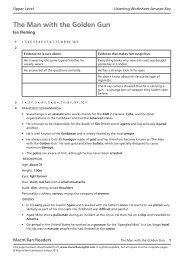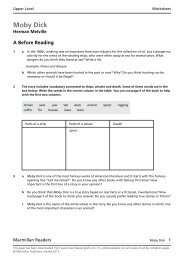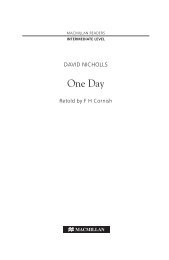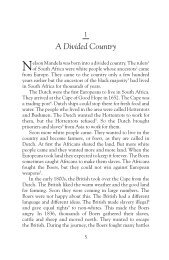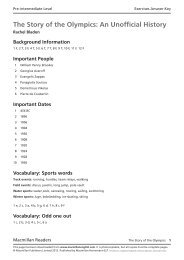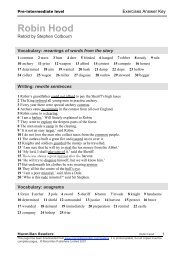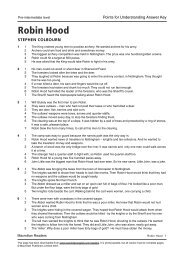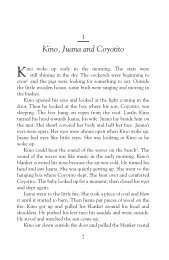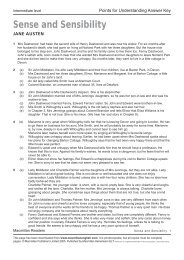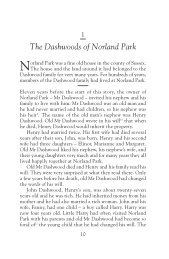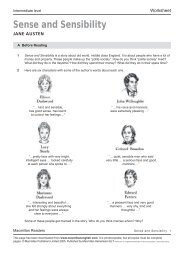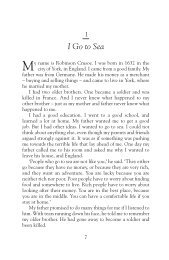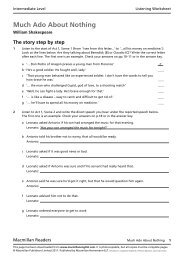Moby Dick Further Study Questions - Macmillan Readers
Moby Dick Further Study Questions - Macmillan Readers
Moby Dick Further Study Questions - Macmillan Readers
Create successful ePaper yourself
Turn your PDF publications into a flip-book with our unique Google optimized e-Paper software.
<strong>Further</strong> <strong>Study</strong> <strong>Questions</strong> Answer key Upper<br />
I would argue that <strong>Moby</strong> <strong>Dick</strong> is not deliberately setting out to kill Ahab. We see evidence of this in<br />
the final three-day battle. Although on the first day the whale does attack Ahab’s boat, he does not<br />
attack the captain once he is in the water, but swims away. On the second day of the final battle when<br />
Fedallah is killed, <strong>Moby</strong> <strong>Dick</strong> again sends Ahab and his whaling boat crashing into the water. Ahab is<br />
left floating in the water for some time, but <strong>Moby</strong> <strong>Dick</strong> does not attack him.<br />
On the third day, <strong>Moby</strong> <strong>Dick</strong> first attacks the other two whaling boats, but leaves Ahab’s alone.<br />
Starbuck begs Ahab to give up the hunt:<br />
“It’s not too late to stop the hunt! Look how <strong>Moby</strong> <strong>Dick</strong> swims away from you. It is you who<br />
look for him, not he who looks for you. Let him go, sir!”<br />
What does the whale represent?<br />
It has been suggested that <strong>Moby</strong> <strong>Dick</strong> represents God, evil, fate and the power of nature. He is seen<br />
as all-powerful and god-like. He is described as destructive and aggressive, attacking whaling boats<br />
and killing whalers, and so he might be seen to represent evil. If we see Ahab’s death as inevitable,<br />
then <strong>Moby</strong> <strong>Dick</strong> is a symbol of Ahab’s tragic fate: to die at his own hands (or by his own rope) killed by<br />
his obsessive need for revenge. <strong>Moby</strong> <strong>Dick</strong> can also be seen as a symbol of the power of nature, and<br />
Ahab’s hunt as man’s obsessive need to control and overcome the powers of nature.<br />
Ishmael<br />
5 Ishmael’s character<br />
What do we know about Ishmael and his past life? Why does he decide to go whaling?<br />
We know very little about Ishmael’s past life. We know that he has been to sea before and that he<br />
chooses to go to sea when he is feeling irritable and bad-tempered and because there is nothing on<br />
shore to interest him. He chooses to be a sailor because he cannot afford to be a passenger, but he<br />
doesn’t want to be a captain because ‘I do not want to be responsible for other men’. He is fascinated<br />
by whales and whaling ships and it is his dream to hunt and catch a whale.<br />
Ishmael tells the story of <strong>Moby</strong> <strong>Dick</strong>. Can we trust his descriptions of events and people? Why/why<br />
not?<br />
On the surface, Ishmael seems to be a fairly reliable narrator. He describes scenes and actions in<br />
detail and does not pass judgement on the characters he describes. But his narration is a first person<br />
narrative, and therefore is subjective.<br />
As a character in the novel, he is simply one of the crew, yet he escapes the common fate that awaits<br />
the whole crew, the ship and its captain. He is the only survivor and this affects his narration. He<br />
is telling the story with hindsight. He knows what happens at the end of the hunt, and the whole<br />
rhythm, pace and shape of his narrative is influenced by this.<br />
We have to question his reliability when he narrates events that he never actually witnessed, for<br />
example, when Starbuck picks up Ahab’s gun and considers the possibility of killing the captain and<br />
rescuing the crew from their fate.<br />
<strong>Macmillan</strong> <strong>Readers</strong> <strong>Moby</strong> <strong>Dick</strong> 8<br />
This page has been downloaded from www.macmillanenglish.com. It is photocopiable, but all copies must be complete pages.<br />
© <strong>Macmillan</strong> Publishers Limited 2009. Published by <strong>Macmillan</strong> Heinemann ELT. Heinemann is a registered trademark of Pearson Education, used under licence.



